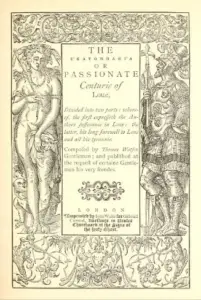 On this day in Tudor history, 26th September 1592, poet and translator Thomas Watson was buried at St Bartholomew-the-Less, in London.
On this day in Tudor history, 26th September 1592, poet and translator Thomas Watson was buried at St Bartholomew-the-Less, in London.
Watson is known for his unusual eighteen-line sonnets and his Latin works, but he was also imprisoned for killing a man after he intervened in a brawl between Christopher Marlowe and William Bradley.
Here are some facts about Thomas Watson:
- He was born in 1555/6 in the parish of St Helen, Bishopsgate, London, but his parents are unknown.
- He was educated at Winchester College from the age of 11 and then went on to Oxford University, where he became friends with poets like John Lyly and George Peele.
- After leaving Oxford, Watson travelled to France and Italy, taking in the cultural surroundings and spending time with poets. He also studied law there.
- He knew Sir Francis Walsingham well and in 1581 carried letters from Walsingham in Paris to William Cecil in England.
- In 1581, he published his Latin translation of Sophocles's "Antigone", but had also previously completed a Latin translation of Petrarch's Canzoniere and written two Latin poems.
- In Spring 1582, Watson published "The Hekatompathia, or, Passionate Century of Love", which he dedicated to Edward de Vere, Earl of Oxford. It was made up of eighteen-line sonnets.
- His early Latin works include a prose treatise, "Compendium memoriae localis", which was printed in 1585, and his 1585 "Amyntas", which was a set of eleven Latin verse lamentations. In 1586, he completed a translation of Collothus's 5th century Greek poem of Paris and Helen for Henry Percy, 9th Earl of Northumberland.
- In 1589, Watson wrote a lyric for a vocal piece by famous Elizabethan composer William Byrd.
- In 1589, Watson intervened in a brawl between Christopher Marlowe and William Bradley. Watson killed Bradley, who had been armed with a sword and dagger, in self-defence after suffering an injury to his thigh. Watson was imprisoned for manslaughter for a few months until he was pardoned.
- In 1590, Watson published "The first sett of Italian madrigalls Englished, not to the sense of the originall dittie, but after the affection of the noate", a translation of madrigals by Italian composer Luca Marenzio.
- Following Sir Francis Walsingham's death, Watson published "An Eglogue upon the Death of … Sir Francis Walsingham" in 1590, which he dedicated to Walsingham's daughter, lady Frances Sidney.
- It is thought that Watson wrote speeches for entertainment hosted by Sir Edward Seymour for Elizabeth I in 1591.
- In 1592, Watson published a 2000-line Latin pastoral "Amintae gaudia" and in 1593, following his death, a sixty-sonnet work, "The Tears of Fancie", was published under the initials "TW".
- Watson died in 1592, a plague year.
Also on this day in Tudor history...
Image: The Hekatompathia, or, Passionate Century of Love, by Thomas Watson.
Notes and Sources
- Chatterley, A. (2008, January 03). Watson, Thomas (1555/6–1592), poet and translator. Oxford Dictionary of National Biography. Retrieved 25 Sep. 2023, from https://www.oxforddnb.com/view/10.1093/ref:odnb/9780198614128.001.0001/odnb-9780198614128-e-28866.



Leave a Reply